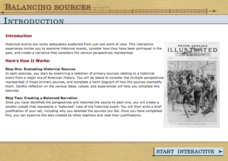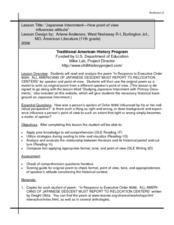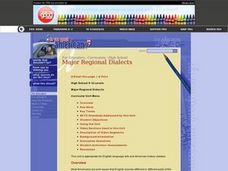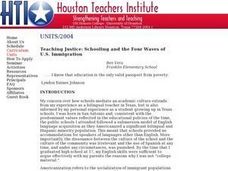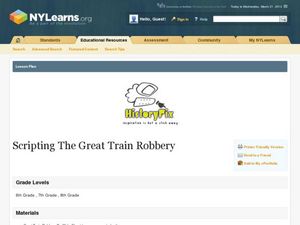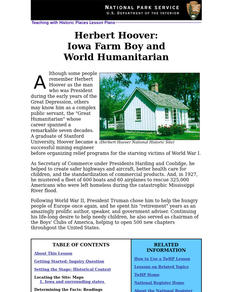Briscoe Center for American History
Applying the SOAPS Method of Analyzing Historical Documents
Young historians use the SOAPS (Speaker, Occasion, Audience, Purpose, Subject) method of questioning to determine the historical value of primary source documents. The third in a series of five lessons that model for learners how...
Annenberg Foundation
Balancing Sources
Pupils turn into investigative reporters throughout history to learn what it takes to balance different primary sources on the same topic. They use what they learn to create a narrative based on their own interpretation of a historic...
Curated OER
Japanese Internment--How Point of View Influences Attitude
How does background and experience influence one's point of view? Dwight Okita's famous poem about the Japanese internment is the text used to explore this essential question. Class members study primary documents to gain the necessary...
Curated OER
The Nineteenth Amendment: Susan B. Anthony
What would your scholars do if Susan B. Anthony walked into class? Shock them to attention with this lesson, which has the school secretary (or any willing participant) dress as the famous suffragette and answer questions as a surprise...
Curated OER
Abraham Lincoln and Frederick Douglass: A Compare and Contrast Lesson Plan
Two great men, one time period, and one purpose; it sounds like a movie trailer, but it's not. It's a very good comparative analysis lesson plan focused on Abraham Lincoln and Frederick Douglass. Learners will research and read...
Curated OER
Major Regional Dialects
What does your dialect sound like? Examine variation in English as it relates to geographic regions with your class. They recognize some of the major differences between regional dialects and determine that everyone speaks a dialect....
PBS
Universal Declaration of Human Rights
What rights are guaranteed to students? Do they align with the Universal Declaration of Human Rights, which was approved by the United Nations in 1948? Middle and high schoolers present persuasive arguments about the rights they believe...
Curated OER
Creating Historians: Send Them Out
Get teenagers out of the classroom in the pursuit of history; part three of a series on approaching social studies as a group of historians.
Curated OER
Teaching Justice: Schooling and the Four Waves of U.S. Immigration
U.S. immigration is the focus of a unit on social justice. Over the course of a school year, young historians read a variety of texts to learn about four waves of immigration that have occurred over time in the U.S. An emphasis on...
ReadWriteThink
Analyzing Famous Speeches as Arguments
A speaker, a message, an audience. After analyzing these elements in Queen Elizabeth's speech to the troops at Tilbury, groups analyze how other speakers use an awareness of events, and their audience to craft their arguments....
Curated OER
Poetry Through Digital Storytelling
Bring digital storytelling to your language arts class! To begin, learners select their own topic, such as a poem that reflects a life experience they had or a historical figure who interests them. Then they work to create a storyboard...
NPR
This Isn't Right: A History of Women in Industry
Women were in the workplace long before Rosie the Riveter pushed up her sleeve. Learn about the working options available to women during the Industrial Revolution, the Progressive Era, and the Great Depression with a lesson that prompts...
National Endowment for the Humanities
Faulkner's As I Lay Dying: Form of a Funeral
Learners read and analyze William Faulkner's novel, 'As I Lay Dying.' They define Faulkner's place in American literary history, describe Faulkner's "South" in the context of the historical South and examine the Bundren family through...
Center for Civic Education
The Power of Nonviolence: Music Can Change the World
Here is a fantastic activity through which class members discover how music has the ability to influence others in a meaningful way. After reviewing selected pieces and modern-day protest songs, learners will research other songs that...
Curated OER
Eloquent Words
Logan’s Lament, a speech delivered by Mingo Chief Logan in 1774, provides pupils with an opportunity to not only study the historical events surrounding the battle between Native Americans and the Europeans for the West Virginia...
Curated OER
Scripting The Great Train Robbery
Take writing prompts to another level in this activity, which allows pupils to create scenes of dialogue based on the 1903 silent film, The Great Train Robbery. Useful for a language arts/history cross-curricular activity, the lesson...
Curated OER
Roaring Twenties: The Impact of High School on its Students Over Time
Eleventh graders compare the American high school experience of the 1920's to today. In this historical perspectives lesson, 11th graders examine surveys from 1924 high school students and then create their own surveys for today's high...
Curated OER
Herbert Hoover: Iowa Farm Boy an World Humanitarian
Students research Herbert Hoover's life and how he became known as a "Great Humanitarian." Students use images and historic places in their research.
Curated OER
Famous Regrets
In this ESL conversation worksheet, students read 15 famous "regrets" in history that use the words "if only." Students identify the speaker. Example: I wish I hadn't cut off my ear. (Van Gogh).
Curated OER
Pequeno Estudio Geografico
There is rich symbolism behind a country's flag. Have your Spanish speakers research a country's flag and inquire about its symbolism. Then, to prepare for their presentation, each learner could find a way to visually represent their...
Curated OER
Historic Heroes
Pupils recognize traits of heroes as depicted in music, art and literature. In this cross curricular activity, students evaluate and analyze various works fo art from different cultures that depict heroes.
Curated OER
Genealogy Research
Personalize history through genealogy. Get your scholars examining their family's past by utilizing resources at your local genealogical society. Learners complete family pedigree charts and choose to do one of the following: research...
Curated OER
The Art of Persuasion-Analysis of Argument
Analyze advertising techniques in order to pinpoint persuasive strategies that writers use. These same techniques are then examined in persuasive speeches. You will have to find your own advertisements, but speeches are included. Finish...
Curated OER
Introduction to Modernist Poetry
Students analyze modernist poetry in depth and detail. The several historical, social, and cultural forces that prompted the modernist movement and its effects are examined in this lesson.



